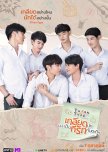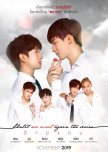
Cette critique peut contenir des spoilers
Bad plot and even worst acting
"Bad Guy My Boss" is a 2024 Thai BL drama that intertwines corporate intrigue with complex romantic entanglements. The series introduces Pat, a diligent secretary who finds himself enamored with his stern, mixed-race boss, Elyes. Despite the hierarchical boundaries, Pat grapples with his growing affection, while Elyes's aggressive advances further complicate their professional relationship.The narrative attempts to explore themes of power dynamics and forbidden love within a corporate setting. However, it falters in execution, presenting a storyline riddled with problematic elements. The portrayal of abusive behaviors, including physical violence, manipulation, and boundary violations, is particularly troubling. For instance, a character commits murder, yet the storyline inexplicably expects viewers to support his romantic endeavors shortly thereafter. This normalization of abuse undermines any potential for meaningful character development and sends a concerning message to the audience.
The plot is further bogged down by an overabundance of love triangles and rivalries (which is a plot point even in the last episode), which dilute the main storyline and create unnecessary confusion and drama. The frequent use of flashbacks and flash-forwards disrupts the narrative flow and leaves viewers disoriented regarding the timeline. Daydream sequences are poorly distinguished from reality, adding to the overall confusion.
Character motivations often lack coherence. For instance, a character devises a convoluted plan that involves acting antagonistically without any subsequent growth or redemption. Production missteps are evident, with mismatched musical scores, awkward camera angles, and jarring 360-degree shots that detract from pivotal scenes. The antagonist is portrayed in a clichéd manner, epitomized by scenes of him sipping wine on a black couch in an empty warehouse—a trope that feels outdated and uninspired.
Logical inconsistencies plague the storyline. Characters make baffling decisions, such as failing to communicate crucial feelings or choosing to harm unrelated individuals instead of directly confronting their primary targets. The depiction of authority figures is unrealistic; a CEO commanding doctors and police officers without plausible justification stretches credibility.
And the worst of it all is, in my opinion, the acting. If the acting was good and the actors managed to portray the character's emotions acurately, this show wouldn't be nearly as cringey as it is. Unfortunately, both leads are horrible, hearing them talk feels like listening to someone reading off a script. They couldn't even portray anger or surprise acurately. This only makes the whole thing unwatchable. I did not like the main characters and their personalities and the actors do absolutely nothing to make these characters more endearing in my eyes. Truth be told, you don't even have to watch the whole thing to see how cringey the acting is. Just watch a scene in an episode where the characters have to display emotions and then you can decide if this is for you.
In summary, "Bad Guy My Boss" squanders its potential by romanticizing abusive relationships and presenting a disjointed narrative. Despite its attempts to offer a fresh take on the BL genre, it ultimately reinforces harmful stereotypes and delivers a viewing experience that is both frustrating and disappointing. The characters are unlikable, the acting horrible and the story lacks the charm that comes with a trope like this (think a Boss and a Babe).If you have any standards when it comes to BL, don't watch this (or you just skim through it if you are afraid of missing out).
Cet avis était-il utile?

SunsetxVibes: Uncut Version
5 personnes ont trouvé cette critique utile
Cette critique peut contenir des spoilers
A Dissapointment to Be Sure
When I first heard about Sunset x Vibes: Uncut Version, I was genuinely excited. The promotional material hinted at a captivating blend of romance and fantasy, which had me intrigued. However, after watching it, I found myself feeling more disappointed than enchanted.The first thing that struck me was the lack of chemistry between Lin and Sun, played by Mos and Bank. I wanted to feel the intensity of their relationship, but the connection felt flat. Mos has a natural charm and screen presence, and I can’t deny that he’s easy to watch. However, it takes more than just looks to create an engaging romance, and unfortunately, the spark between him and Bank just wasn’t there. Oddly enough, I felt more chemistry between them in their off-screen social media interactions than on screen, which was incredibly frustrating. For instance, I had high hopes for the painting scene—it was hyped as a pivotal, sensual moment in the show. But instead of being moved or captivated, I found myself cringing at how poorly it played out.
Another major issue for me was the character development, especially with Bank’s character, Lin. Rather than coming across as strong or endearing, he often felt overly helpless, passive, and frustratingly naive. I found myself annoyed by his wardrobe and overall presentation, which felt infantilizing and out of place for the role. The use of “Dad” instead of “Daddy” as a nickname for Sun was especially jarring. Instead of adding any layer of intimacy, it felt awkward and uncomfortable, making it harder to connect with their relationship.
And then there was the dialogue. I kept hoping it would improve, but it never did. Many of the lines felt so forced and unnatural that it was almost as if an AI wrote them. Conversations didn’t flow, and they lacked the emotional depth I was hoping for. I noticed this lack of realism not just in the leads but also among the side characters, who rarely felt like they contributed anything meaningful to the story.
As for the NC-17 scenes, I was disappointed to find them lacking in sensuality. In theory, these moments should have been a high point for the series, adding some intensity to the romance. Instead, I found them either awkward or outright laughable. One scene, in particular, had a loud “slurping” sound that was so over-the-top it broke any sense of immersion I’d managed to hold onto, turning what should have been a tender moment into something bizarre.
However, not everything about the show was a letdown. I genuinely liked Sam and Yoh, one of the side couples. Their chemistry felt more authentic and brought some relief to the otherwise lackluster romance of the main pair. If only they’d had more screen time! Watching them, I felt a glimmer of what Sunset x Vibes could have been. Unfortunately, they were underutilized, and their storyline felt like an afterthought rather than a well-developed subplot.
In the end, Sunset x Vibes: Uncut Version didn’t live up to my expectations. While Mos’s performance showed potential and Sam and Yoh gave me brief moments of enjoyment, the series as a whole felt disjointed and unpolished. For anyone looking for a compelling BL drama with genuine chemistry and a strong storyline, I’d have to say this one falls short. If you’re still curious, maybe go in with lower expectations—or look for other shows that deliver the emotional depth and connection this one seemed to miss.
Cet avis était-il utile?

Cherry Blossoms After Winter
1 personnes ont trouvé cette critique utile
Cette critique peut contenir des spoilers
Great Acting, Fluffy Story
I recently watched Cherry Blossoms After Winter, and as someone who enjoys soft, coming-of-age romances, I found it to be a charming and endearing series. Based on a popular BL manhwa, the story follows Tae Sung and Hae Bom, two high school students who have grown up together under the same roof but only now find themselves as classmates. The narrative centers on their developing relationship, and while it doesn’t dive into intense conflicts or dramatic twists, it explores themes of friendship, love, and self-acceptance in a way that really resonated with me.I appreciate that the show stays true to the source material, capturing the essence of a youthful romance that blossoms gradually. Admittedly, the pacing felt a bit off at times, likely due to the short runtime and episodic format, but I found that these minor issues didn’t detract too much from the story. It’s a sweet and gentle romance, so I came in with modest expectations and felt satisfied by the end.
The chemistry between the leads, Ok Jin Uk (Tae Sung) and Kang Hui (Hae Bom), truly shines. Watching them fumble through their feelings, sometimes awkwardly and sometimes shyly, reminded me of the nervousness and sincerity that comes with first love. Tae Sung’s character starts off a bit reserved, but seeing him open up and reveal his softer side was so endearing. Hae Bom, on the other hand, is gentle and kind-hearted, someone who works hard despite his vulnerabilities. I found myself rooting for them not only as a couple but as individuals who are each learning to embrace themselves.
In terms of production quality, I have to say that while Cherry Blossoms After Winter may not boast high-budget visuals, there’s something about its simplicity that worked well with the story. The cinematography is soft and warm, with close-up shots that capture the characters’ subtle glances and tender interactions. It doesn’t have the glossy, high-budget look of some other dramas, and at times, it does feel a bit low-budget, but I found that it matched the story’s slice-of-life vibe. The minimalist sets and short episodes reminded me of a small-scale production, but instead of being disappointed, I felt like this simple style allowed the story’s sweetness to shine through.
The supporting cast also deserves some appreciation. Though they don’t take up too much screen time, I loved how they added depth and texture to the story. The family dynamics and friendships helped me see the main characters in a more complete light, making them feel relatable and grounded in a supportive community. The show’s secondary characters may not be complex, but they’re kind and supportive, adding to the overall warmth that I felt while watching.
I also noticed that while the soundtrack isn’t particularly memorable, it fits well with the mood of the show. The music felt understated but effective, giving a gentle boost to key scenes without overshadowing the moments. The lack of standout music might be a downside for some, but for me, it worked in line with the subtle vibe of the story.
Overall, Cherry Blossoms After Winter left me with a heartwarming impression. It’s a feel-good drama that emphasizes the simplicity of young love and the beauty of friendship. If you’re in the mood for a soft, sweet story that doesn’t try to do too much, I think this drama is worth a watch. It’s not the most intricate or high-stakes series out there, but it’s incredibly comforting and wholesome. Fans of BL and high school romances will likely find it a lovely escape—one that highlights just how impactful small acts of tenderness can be.
Cet avis était-il utile?

Cette critique peut contenir des spoilers
One of My Favorite Comfort Shows
When I started watching Ai Long Nhai, I was drawn to the simplicity of its premise—a classic "love at first sight" romance set in a university backdrop. It felt comforting and nostalgic, something I could sit back and relax with, something simple and lacking any sort of angst and on that front, this show delivered marvously, at least for me. This show remains, even to this day, my go to show for rewatching. The fact that I have rewatched it over 15 times says a lot about how I feel about it.The story follows Ai and Nhai, two students who meet by chance and quickly become entangled in each other's lives. Initially, I found myself charmed by the straightforward nature of their relationship—there’s an immediate attraction that leads to a sweet, if sometimes cliché, romance. The series doesn’t shy away from the typical BL tropes, which isn’t necessarily a bad thing if you’re in the mood for something familiar. But as much as I wanted to stay invested in the plot, I couldn’t help but feel like the storyline lacked depth. It’s as if I was watching the characters go through the motions rather than witnessing them experience real growth or challenges. And while this might mean an immediate "drop" for some viewers, the simplicity of it didn't bother me that much as I don't rewatch the show for the plot, or rather the lack of plot.
In regards to the characters, one aspect that really stood out to me was the portrayal of Nhai. He’s incredibly naive and almost childlike, which initially felt endearing, but over time started to feel a little out of place. I found myself wishing for more complexity in his character. His innocence bordered on immaturity, and it was hard to buy into his romantic relationship with Ai because he seemed stuck in this overly simplistic view of the world. I would have loved to see him develop, even just a bit, throughout the series.
On the flip side, I was pleasantly surprised by the chemistry between the leads, especially given the varied reviews. Their interactions, though sometimes inconsistent, had a genuine warmth. This is the main reason for the number of times I have rewatched the show. Ai and Nhai are simply so sweet together and Nhai is actually adorable instead of bratty when he is with Ai. While their intimate scenes are somewhat...lackluster in terms of sensuality (especially compared to couples who are extremely comfortable with NC scenes, like FortPeat) but it makes up for that in terms of emotions. But nonetheless, don't start watching this show for the NC scenes, you'll be dissapointed on that front.
In terms of side characters, I liked Nhai and Ai's friend group and I especially enjoyed seeing Arm and Porsch, who are a real-life couple, play supporting roles. Their presence added a nice, authentic touch to the dynamic of relationships portrayed on screen.
The production quality is...okay. Visually, the series is easy on the eyes, with bright, well-framed shots and a soundtrack that matches the overall tone of lighthearted romance. However, I must note that this is a low budget production and it shows. At times, the sound quality is really bad and the props and set feels cheap. It pulled me out of the story a few times because of it. Another issue I had is the acting. The acting is...awkward at times. While MeenPing's chemistry on screen is undeniable, I don't really consider them good actors. While this might be because of the directing, but there are scenes that felt awkward and off, making me want to skip them altogether.
In the end, Ai Long Nhai is a mixed bag. There are definitely sweet, enjoyable moments that made me smile and appreciate the simplicity of their romance. However, the lack of character development and the awkward directing, acting and dialogues did make me cringe at times. If you’re looking for a series that doesn’t stray too far from the typical BL formula, this might be an enjoyable watch. But if you’re craving something with more emotional complexity or depth, Ai Long Nhai may not quite hit the mark. For me, it was an enjoyable watch and one that I would go back time after time.
Cet avis était-il utile?

Cette critique peut contenir des spoilers
Great Chemistry; Weak Plot
"TharnType: The Series" left me with mixed feelings. While the premise of two polar opposites falling in love, especially with one of the characters harboring a profound hatred for gay people due to trauma from his childhood, is cliche, the show does deliver on it pretty well so for people who enjoy this type of storyline, they won't be dissapointed. However, it should be noted that storyline is intense, and it’s not your typical sweet romance; it dives into heavier themes like overcoming prejudice, personal healing, and exploring one’s sexuality.From the start, the chemistry between Mew Suppasit, who plays Tharn, and Gulf Kanawut as Type is undeniable. Their connection feels genuine and raw, drawing me into their relationship and making it easy to get swept up in their emotions. Mew and Gulf bring a captivating physicality to their scenes, and I was genuinely impressed by how well they embodied these roles. They manage to make the progression of their romance believable, despite some of the more controversial scenes. Their chemistry is the glue holding the show together, and it’s no surprise that they quickly gained a huge fanbase from this series alone.
That said, "TharnType" is not without its flaws. One of the hardest parts for me was the way certain sensitive themes were handled. Type’s homophobia, a result of his past trauma, is understandable in context, but some of the methods Tharn uses to break down those walls felt manipulative or even problematic. The story relies on a lot of intense, sometimes harsh, interactions between the two, which can feel uncomfortable to watch. I had to remind myself that this series was aiming to portray a more intense and complex relationship rather than a straightforward love story, but still, some scenes felt hard to justify. If you are looking for a simple, healthy romance, please skip this show. Both Tharn and Type are problematic in their own ways and it was difficult for me to forget how Tharn basically forced himself on Type because he wasn't happy with the way Type acted and how Type agreed to go on a date with a girl, even going as far as going to her home, while he was still sleeping with Tharn. These two aren't very likable characters in my opinion and it says a lot about how good the acting was for me to be able to enjoy the show even with them as the leads.
The plot occasionally feels rushed, with moments that seem glossed over, and at times I wished there was a more nuanced approach to addressing Type’s trauma and emotional growth. Despite this, the story’s arc does show his gradual transformation, as he begins to confront his own fears and prejudices, largely due to Tharn’s unwavering patience. It’s satisfying to see the progress Type makes, even though I wished it had been portrayed with a bit more sensitivity.
Beyond the main plot, "TharnType" also does a decent job at portraying friendships and secondary relationships. The supporting characters add depth to the main couple’s story, especially Techno, Type’s best friend, who often serves as a voice of reason. The series might not be perfect, but it’s refreshing to see a BL drama attempting to tackle tough themes and give its characters complex backstories.
Overall, "TharnType: The Series" is both engaging and polarizing. The romance is fiery and passionate, and the leads bring a lot of heart to their roles, making it easy to get invested in their journey. However, I’d recommend approaching it with an open mind and some caution, especially given the series’ more intense moments. While I found it compelling, it’s not for everyone, and it’s definitely a story that pushes boundaries within the BL genre. If you’re a fan of love stories that delve into complex issues and don’t shy away from the darker side of relationships, "TharnType" is worth the watch – just be prepared for an emotional rollercoaster.
Cet avis était-il utile?

Cette critique peut contenir des spoilers
An Absolute Classic
"Until We Meet Again" is a poignant exploration of love, reincarnation, and the deep scars left by past lives, masterfully weaving together the present and the past through its two leads, Pharm and Dean. The story is grounded in the Buddhist concept of karma and the belief that souls that are bound by the red thread of fate, are destined to find each other across lifetimes. This thematic foundation adds a layer of spiritual resonance to what might otherwise be a straightforward romance, making it stand out in a genre often characterized by more conventional plots.1. Story: The narrative structure of "Until We Meet Again" is driven by Pharm's gradual recollection and acceptance of his past life, where he and Dean's previous incarnations, In and Korn, faced insurmountable societal pressures that ultimately led to a tragic ending. Unlike many romantic dramas, which might rely on external obstacles like rival lovers or misunderstandings, this story delves into the internal struggles of its characters—struggles that transcend time and carry over into their present lives.
The simplicity of the plot is both a strength and a weakness. On one hand, it allows the viewer to fully immerse themselves in the emotional journey of Pharm and Dean without being distracted by unnecessary plot twists. The juxtaposition of sweet, tender moments in the present with the heart-wrenching memories of the past creates a rollercoaster of emotions, but one that is carefully balanced. Unlike more relentlessly tragic shows like "Absolute Zero," "Until We Meet Again" offers moments of respite and joy, which helps to prevent emotional fatigue.
However, the show's reliance on the past-life suicide as a central plot device can feel somewhat heavy-handed. While it's clear that this event is meant to underscore the intensity of In and Korn's love and the tragic nature of their circumstances, some viewers might find it difficult to fully accept this as the only possible outcome. The narrative doesn't fully explore other potential avenues the characters could have taken and why they haven't taken them, which might leave some viewers feeling that the tragedy was more contrived than inevitable. Nevertheless, if one views the suicide as a symbolic act—representative of the inescapable suffering that comes from societal rejection—rather than a literal inevitability, it becomes easier to digest.
2. Acting/Casting: The casting of Ohm Thitiwat and Fluke Natouch as Dean and Pharm is one of the show's greatest strengths. Their chemistry is palpable, and they bring a genuine warmth to their characters' interactions that makes their romance feel both inevitable and deeply satisfying. Despite the limitations in some of the acting, particularly in Ohm's more stoic portrayal of Dean, the emotional connection between the leads shines through. Fluke's ability to convey vulnerability and sorrow, especially in the scenes where Pharm confronts his past, is particularly noteworthy. His tears feel raw and unforced, pulling the viewer into his emotional state.
The supporting cast, while not as central to the plot, provides a solid backdrop to the main story. Sammy's character adds a layer of lightness and humor that helps to balance the more intense moments, while Earth's portrayal of Intouch (Pharm's past self) is a standout. He captures Intouch's optimism and love for Korn with such sincerity that it makes the inevitable tragedy all the more heartbreaking. The secondary couple, although less memorable, offers a more subdued counterpoint to the main romance, catering to viewers who might prefer a less dramatic love story.
Cinematographically, the show does what it needs to without going beyond the basics. There are no particularly breathtaking scenes or innovative camera work, but the visuals are clean and serviceable, ensuring that the focus remains on the characters and their story.
3. Music: The OST of "Until We Meet Again" is nothing short of iconic. Music plays a crucial role in this show, acting almost as a character in its own right. The haunting melodies that accompany the more emotional scenes stay with you long after the episode ends, evoking a strong sense of nostalgia and longing. The music's ability to elicit tears with just a few notes is a testament to its power and how deeply it is intertwined with the narrative. It's rare for an OST to have such a profound impact, but here, it elevates the show to another level, making it unforgettable.
4. Rewatch Value: "Until We Meet Again" is one of those rare shows that doesn't lose its impact on repeat viewings. Even if you know every twist and turn of the plot, the emotional depth and the beautifully crafted moments between the characters make it worth revisiting. For fans of romantic dramas, this show offers everything one could want—intensity, sweetness, heartbreak, and hope—all wrapped up in a story that feels both timeless and deeply personal. While some aspects of the plot may not hold up to intense scrutiny, the overall experience is one of emotional catharsis. It's the kind of show that lingers in your mind, inviting you to return to its world again and again.
In conclusion, "Until We Meet Again" is not without its flaws, but its strengths far outweigh them. The simplicity of the story, the chemistry between the leads, the unforgettable OST, and the delicate balance of joy and sorrow make it a must-watch for fans of the genre. If you're looking for a show that will make you feel deeply and stay with you long after the final credits roll, "Until We Meet Again" is a perfect choice.
Cet avis était-il utile?

Cette critique peut contenir des spoilers
Great Chemistry; Weak Story
The show offers a predictable and clichéd plot that doesn’t stand out, relying heavily on the strong chemistry between the main couple, Fort and Peat, to keep viewers engaged. Their natural and genuine connection, especially in the NC scenes, is the highlight of the series, elevating it above its otherwise unremarkable narrative. While the secondary GL couple adds a sweet dynamic, the show’s dialogue and music are forgettable, contributing little to the overall experience. Rewatch value is limited to the NC scenes, making the show worth watching mainly for fans of the FortPeat pairing, despite its shortcomings in story and originality.1. Story: The plot of the show is nothing to write home about—it's predictable, cliched, and doesn't offer any surprising twists or deep narrative developments. If it weren't for the actors' strong performances, particularly the main couple, the show would likely fall flat. The chemistry between the leads is the saving grace, transforming what could have been a dull experience into something enjoyable. Because the story is so basic, there's not much to dissect or discuss. The dialogue is serviceable—neither cringeworthy nor particularly memorable—and the characters are likable enough to keep viewers engaged, albeit with low expectations.
The highlight of the show, however, isn't the story but the NC (sexually explicit) scenes. This says a lot about the overall quality of the plot, as these scenes outshine the rest of the narrative. If you don't mind a story that's heavily reliant on tropes and predictability, you might find it perfectly watchable. Fans of similar shows, like Love in the Air (particularly the Prepai and Sky parts), might find some enjoyment here, as the tone and structure are quite similar. The story revolves around character A, who is emotionally scarred due to a past experience (in this case, related to his mother instead of a former lover) and has lost faith in love. Character B enters his life and slowly convinces him that love is real. The inevitable breakup occurs because A is scared of getting hurt again and pushes B away, claiming he no longer loves him. B leaves temporarily, only to return later, leading to a heartfelt reunion where A confesses his true feelings. The story sticks to a well-worn formula, lacking any substantial elements that could set it apart—such as a sexual assault subplot, which is notably absent here.
2. Acting/Cast: The chemistry between Fort and Peat is what truly elevates this show. Their on-screen connection is so natural and palpable that it becomes the focal point of the entire series. Without them, the show would likely crumble under the weight of its unoriginal plot. The affection and intimacy they share seem to leap off the screen, making their performances feel genuine and deeply engaging. There's nothing awkward or forced about their interactions, and their acting perfectly captures the essence of their characters.
What really sets their performances apart are the NC scenes. Unlike other shows where such scenes can feel staged or uncomfortable, Fort and Peat bring a level of realism and intensity that makes these moments incredibly sensual and believable. It's not just about what the audience sees but how convincingly they portray their characters' desire and passion for one another. The fact that the show is over is disappointing, not because of the plot, but because it means we won't get to see more of Fort and Peat together. Thankfully, their other videos are still available online for fans to enjoy. Additionally, the secondary GL (Girl's Love) couple adds a charming dynamic to the show, with their sweet and adorable relationship providing a nice contrast to the main couple's more intense connection.
3. Music: The soundtrack is entirely forgettable. There's nothing in the musical score that stands out or adds any significant emotional depth to the scenes. It's serviceable at best but doesn't contribute anything noteworthy to the viewing experience.
4. Rewatch Value: The only scenes worth revisiting are the NC scenes, which stand out for their raw chemistry and intensity. The rest of the show, however, lacks the substance or excitement needed to make it worth a second viewing. For those who enjoyed Love in the Air more, it's likely that they'd prefer to rewatch that series instead. Despite the show's blandness, there's still an element of enjoyment, but that can largely be attributed to a bias towards the FortPeat pairing.
All in all, the series is relatively light and fluffy. Although there's a breakup, it's resolved quickly, within a single episode, so for viewers who aren't fans of dramatic tension, the last episode could easily be skipped. Overall, the show is worth a watch primarily for the incredible chemistry between the leads, making it a decent recommendation despite its shortcomings.
Cet avis était-il utile?


